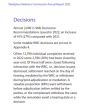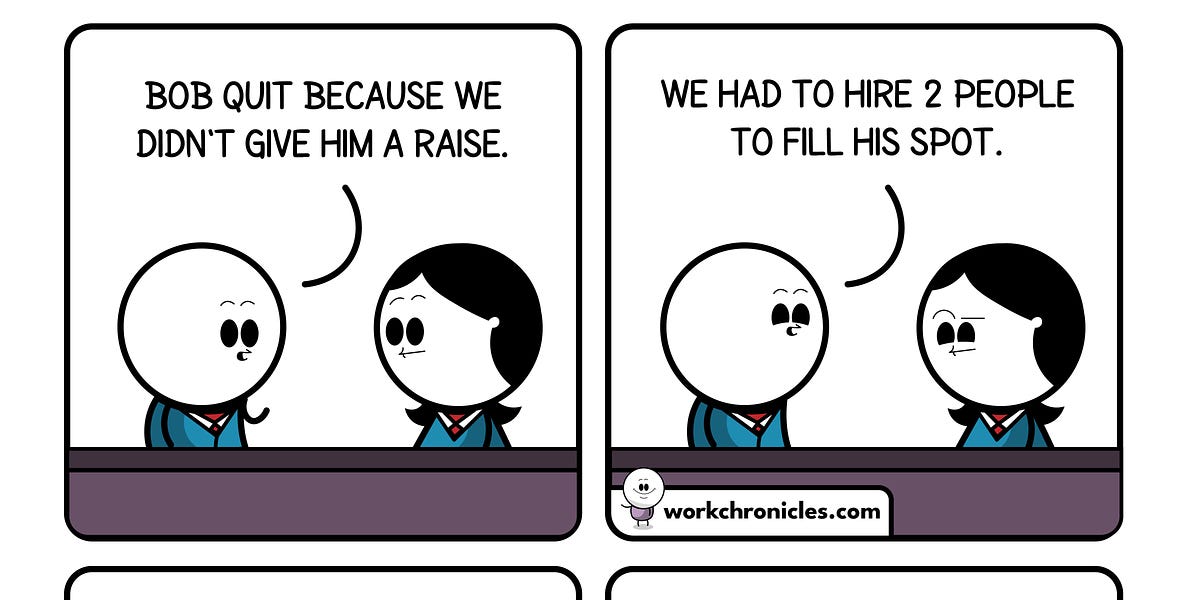If you want to make stuff up, post elsewhere.Yes I can!
You are using an out of date browser. It may not display this or other websites correctly.
You should upgrade or use an alternative browser.
You should upgrade or use an alternative browser.
Return to office - but I want to remain fully remote
- Thread starter Samba ramba
- Start date
Brendan Burgess
Founder
- Messages
- 54,628
I'll flounce off to the WRC who will almost always side with the employee!
Hi Marsupial
I looked for stats to prove you right or wrong, but I can't find any.
The WRC Annual Report doesn't seem to give it as far as I can see?

Oddly enough, they do say how many of their decisions were referred to the Labour Court and upheld or rejected.
Brendan
There can be strong positions held by either side. I recently heard of a government department that refused mediation, such was their assurance of their position.That depends entirely on how you define "strong cases". How would you define the recent one that involved the solicitor daughter of a prominent Mayo family!
Going back to the original poster, I can't get my head around a company that has managed to create a role that requires absolute quite and cannot be carried out in an open plan office while at the same time not allowing an absolutely quite space. What is that role?
I work on detailed information and provide detailed info to others from an open plan office. If things heat up and I need some extra concentration, I disappear into a meeting room for a period of time and then re-emerge. It accepted.
Open plan offices being too noisy is a common complaint.
"...On the contrary, a plethora of research papers identify negative impacts of open-plan office layout..."
In some offices it now too quiet on off peak days, as every noise is amplified by open plan space which is half empty. On the peak days (anchor) its super noisy because there so much extra interaction.
That is a complete fallacy these days. The days of sitting at a desk beside someone for a week are well gone. That is not how young people learn or want to learn these days.
They way people work now compared to even 10 years is completely different and so are training needs. Nearly everything now is done through online collaberation where you have much more fflexibility. If I asked a new graduate to come in and watch me how I do things for hours on end, they would be out the door within a week.
Even on the building of relationships, that companies talk so much about. They don't really care about that. They care that people are seen to join various groups around inclusion and equality etc that make them sound like great employers but that's lip service. People build relationships by spending time with people outside a work situation. That's why tech companies put in pool tables, game machines, chill out rooms etc etc but no traditional company has ever embraced that. Indeed they were laughed at because 'people should be at the desk'...
Building a culture doesn't depend on me or any of the people in my team being in the office 5 days a week or partaking in extra curricular activities. We build our goals and objectives around what the executive committee tells us are the values of the company e.g. protect the customer every single day. We deliver on that and it can be measured. None of that has to be done in the office but nobody can tell us that we don't align to the company's culture.
There's a lot of lip service around company culture. I'd argue the culture as presented to customers, or how the business is run, is totally different thing than the internal culture of the internal work environment.
For example if you have to have events to build culture then there's probably an issue. Its probably reflected in the churn metrics. Staff retention.
Are people not concerned that if a job can be fully remote that these jobs overtime will be relocated to other cheaper locations…think of all the IT/HR/payrole/tech eng support roles that have been been lost in many Pharma/Med device companies?
I find with outsourcing you never get a 1:1 replacement. You might work that used to require 10 people, being outsourced, but you end up having to have 2 or 4 people manage that outsourcing. Everything also tends to take longer when it outsourced as there lag in communication and understanding. Then there's all the legal work, contracts, support agreements that has to be created for outsourcing. So there a lot of hidden overheads.
It changed long before Covid. Unfortunately people are too afraid to get sloshed on company do's now because they get the book thrown at them if anyone gets offended, probably generational. The anti-smoking brigade means we are very anti social (to smokers) now. As mentioned previously, I used to go out on smoke breaks all the time even though I didn't smoke. It was a great place for work related chats/collaboration be in gossip or problem solving.
Not even smoking. People used to have banter in the canteen and over a coffee. Now they'll have company coffee meetings to create culture, while at the same time complaining about how long people leave their desk to get a drink of water. Look at those Amazon stories about people unable to get a bathroom break. Catch 22.
Hi,
Hoping to get some advice.
Since Covid I have been working from home until a few months ago when they requested I go back to the office 1 day a week or 2 half days. I said I'd give it a try but I knew it wasn't going to be suitable. It's an open plan office & the majority of my work is very detail orientated so peace & quiet is essential for me to fulfill my role.
I spoke to my manager about it numerous times but he was always very dismissive & I was basically told "I need to adapt". A few weeks ago he said he wanted to increase my time in the office to 40% of the week. Keep in my my role hasn't changed. I moved to a smaller open plan office but still find it impossible to concentrate properly.
The last couple of weeks have been very challenging workwise. In order to get through the workload I moved to an office that isn't occupied 90% of the time so I could concentrate. This wasn't good enough either - I was accused of trying to take over that office but for the few days I used it no one else actually needed it or even entered the room. It was never my intention to "take over" that office on a permanent basis, I saw it as an opportunity to tick the box of turning up to the office but also have the space & quiet needed to perform effectively during a particularly busy time.
Others in the company work remotely & do not have to operate under the same conditions as I do. Its fair to say my manager has an issue with me even though I'm one of the top performers & there has never been a reason to question my work rate.
Considering all of this how do I approach them to back off & return to more time at home? I'm being treated very differently to other colleagues for absolutely no reason.
I like the company & job I do but doing it in an open plan office is simply not working & is leading to delays in completing tasks. Also I have an office in my home so it's not as if I'm sitting at the kitchen table or working from the couch.
Depends whats in your contact. Working remotely is probably a perk, or privilege that can be withdrawn or adjust to suit business needs as defined by your line manager. So your line manager is on a crusade about it, Its not really a battle you can win.
That a manager most important issue is where you are rather than what you do, means performance is no longer headline metric you think it is.

(comic) Hiring 2 to replace 1
Comics about work. Made with love and lots of coffee.
yes but chatting in the canteen is organic and natural, "company coffee mornings" thats like forced fun and you wont have full participation just people that feel they have to go in order to be relevant. Also in the canteen you would be also chatting to workers that are in production or facilities or engineering not exclusively the office bubble. I think the amazon story was more about warehouse staff being timed in the toilet, same thing used happen in lidl back in its deep discounter days, dont think that applies to too many office staff, especially when it is a battle to even get them in even for 1 day a week,Not even smoking. People used to have banter in the canteen and over a coffee. Now they'll have company coffee meetings to create culture, while at the same time complaining about how long people leave their desk to get a drink of water. Look at those Amazon stories about people unable to get a bathroom break. Catch 22.
In almost every office I've ever worked in, eventually a line manager will appear at some point who starts micro managing peoples time. Amazon stories are just the extreme end of the same iceberg.
Working remotely was a nice respite from all that. But it's creeping back now as days in the office increase.
Working remotely was a nice respite from all that. But it's creeping back now as days in the office increase.
Last edited:
You can say that about alot of topics, I doubt it because it's generating alot of interest, alot of new posts everyday ,passionate ones at that , Surely that's what an online discussion forum is for?It must be time to kill this topic
Everything that can be said, has been said
Last edited:
Brendan Burgess
Founder
- Messages
- 54,628
I emailed the WRC as follows:
I had a look at the WRC Annual Report for 2022 and it says

But oddly enough, it does not give a breakdown of how many complaints were upheld?
Do you have this information or should I complete an FoI on it?
The reason I ask is that there is a public perception that the WRC always upholds employees' complaints which I presume is wrong.
They replied:
Given the nature of the work of the WRC and the varied manner in which complaints may be dealt with e.g. settled, withdrawn prior to and/or during hearings, etc these figures are not available.
The WRC is impartial in administration of justice.
The latest WRC decisions are available on the WRC website: https://www.workplacerelations.ie/e...notices/latest-decisions-recommendations.html
My original email:
I had a look at the WRC Annual Report for 2022 and it says

But oddly enough, it does not give a breakdown of how many complaints were upheld?
Do you have this information or should I complete an FoI on it?
The reason I ask is that there is a public perception that the WRC always upholds employees' complaints which I presume is wrong.
They replied:
Given the nature of the work of the WRC and the varied manner in which complaints may be dealt with e.g. settled, withdrawn prior to and/or during hearings, etc these figures are not available.
The WRC is impartial in administration of justice.
The latest WRC decisions are available on the WRC website: https://www.workplacerelations.ie/e...notices/latest-decisions-recommendations.html
My original email:
Makes complete sense, I know the policy in the multinational where I work in is to ensure nothing ever gets to the public realm, anecdotal evidence from peers in other organisations suggest similar practices. In a competitive employment market, a bad headline can really affect your ability to hire.Given the nature of the work of the WRC and the varied manner in which complaints may be dealt with e.g. settled, withdrawn prior to and/or during hearings, etc these figures are not available.
Just reading through some of the cases, I don't see any suggestion of bias either way, and when a small number of employers act like this and are so naive as to allow a case progress to the public domain, is it any wonder they often find in the employee's favour at that stage!
losttheplot
Registered User
- Messages
- 656
I think it's media bias. Only the interesting and bizarre, extreme cases are reported.Makes complete sense, I know the policy in the multinational where I work in is to ensure nothing ever gets to the public realm, anecdotal evidence from peers in other organisations suggest similar practices. In a competitive employment market, a bad headline can really affect your ability to hire.
Just reading through some of the cases, I don't see any suggestion of bias either way, and when a small number of employers act like this and are so naive as to allow a case progress to the public domain, is it any wonder they often find in the employee's favour at that stage!
I know of one case of a relative who is a small business owner. Dispute with employee and employee was awarded 10k. Covered in a few newspapers, Sunday World etc. Case was appealed and overturned, no award. But that's not followed up by the papers.
That’s interesting.I think it's media bias. Only the interesting and bizarre, extreme cases are reported.
I know of one case of a relative who is a small business owner. Dispute with employee and employee was awarded 10k. Covered in a few newspapers, Sunday World etc. Case was appealed and overturned, no award. But that's not followed up by the papers.
How vigorously did they defend the initial complaint to the WRC? What made the difference at appeal?
losttheplot
Registered User
- Messages
- 656
I don't know the full details of the case. Business premises need to close for a few months so there was no work. Employee asked to be let go so they could claim Unemployment Benefit. Owner agreed to let them go. I think they began to dispute whether they were let go or if it was redundancy. Don't know what the grounds for appeal were.That’s interesting.
How vigorously did they defend the initial complaint to the WRC? What made the difference at appeal?
Thanks.I don't know the full details of the case. Business premises need to close for a few months so there was no work. Employee asked to be let go so they could claim Unemployment Benefit. Owner agreed to let them go. I think they began to dispute whether they were let go or if it was redundancy. Don't know what the grounds for appeal were.
The reason I ask is that I’m aware of small companies that don’t take WRC complaints seriously to the point where they don’t even show for the adjudication. They then leap into action at the point at which there’s an adverse finding that they then seek to appeal at the Labour Court.